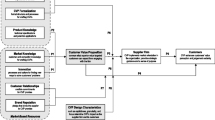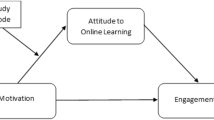Abstract
This paper describes the results of a mail survey to the educator membership of the American Marketing Association. Data were collected regarding beliefs about both the frequency of occurrence and severity of 59 ethical issues facing marketing faculty. The research questions examined include: What unethical practices are believed to most commonly occur? What practices are most severe? How do these beliefs vary by faculty rank and size and type of school? Implications for both the improvement of marketing education and for future research are provided.
Similar content being viewed by others
References
“Alabama Chancellor Involved in Controversial Statements on Resumé, Quits.” 1987.The Chronicle of Higher Education, 33 (September 9): A-15.
“AMA Adopts New Code of Ethics.” 1987.The Marketing News, 21 (September 11): 1.
Anderson, L. McTier. 1986. “AMA Should Get Tough with its New Code of Ethics.”The Marketing News, 20 (July 18): 2.
Bennett, Amanda. 1988. “Ethics Codes Spread Despite Skepticism.”The Wall Street Journal, 212 (July 15): 19.
Blum, Debra, 1988. “Plagiarism in Speeches by College Presidents Called ‘Capital Offense’ and ‘Ultimate Sin’.”The Chronicle of Higher Education, 34 (July 27): A-11.
Brown, Robert D., and LouAnn Krager. 1985. “Ethical Issues in Graduate Education.”Journal of Higher Education, 56 (July/August): 403–418.
Bunke, Henry C.. 1988. “Should We Teach Business Ethics?.”Business Horizons, 37 (July/August): 2–8.
Business Roundtable. 1988. “The Rationale for Ethical Corporate Behavior.”Business Horizons, 37 (July/August): 33–36.
Byrne, John A. 1988. “Businesses are Signing Up for Ethics 101.”Business Week, February 15: 56.
Chonko, Lawrence, Shelby Hunt, and Roy D. Howell. 1987. “Ethics and the American Advertising Federation Principles.”International Journal of Advertising, 6: 265–274.
Coe, Ted, and Barbara Coe. 1976. “Marketing Research: The Search for Professionalism.” InMarketing: 1776–1976 and Beyond. Kenneth L. Bernhardt, ed. Chicago: The American Marketing Association.
“College Can Fire Teacher for Swearing at Students in Class, U.S. Court Rules.” 1987.The Chronicle of Higher Education, 33 (January 21): 13.
Crane, Diane. 1967. “The Gate Keepers of Science: Some Factors Affecting the Selection of Articles for Scientific Journals.”American Sociologist, 2 (November): 105–201.
Cron, William L., 1984. “Industrial Salesperson Development: A Career Stages Perspective.”Journal of Marketing, 48, (Fall): 41–52.
Davis, Stanley M. William Rudelius, and Roger Buckholz. 1979. “Ethical Problems of Purchasing Managers.”Harvard Business Review, 57 (March/April); 6–17.
Day, George S. 1975. “The Threats to Marketing Research.”Journal of Marketing Research 12 (January): 462–467.
DeLoughry, Thomas J., 1987. “Widespread Piracy by Students Frustrated Development of Computer Software.”The Chronicle of Higher Education, 33 (August 17): 1.
Dubinsky, Alan J., Eric N. Berkowitz, and William Rudelius. 1980. “Ethical Problems of Field Sales Personnel.”MSU Business Topics, 28 (Summer): 11–16.
Ferrell, O. C., and Larry G. Gresham. 1985. “A Contingency Framework for Understanding Ethical Decision Making in Marketing.”Journal of Marketing, 49 (Summer): 87–96.
Ferrell, O.C., and Stephen J. Skinner. 1988. “Ethical Behavior and Bureauratic Structure in Marketing Research Organizations.”Journal of Marketing Research, 25, (February): 103–109.
Ferrell, O.C., Mary Zey-Ferrell, and Dean Krugman. 1983. “A Comparison of Predictors of Ethical and Unethical Behavior Among Corporate and Agency Advertising Managers.”Journal of Macromarketing, 3 (Spring): 19–27.
Ferrell, O.C., and Mark Weaver. 1978. “Ethical Beliefs of Marketing Managers.”Journal of Marketing, 42 (July): 69–73.
Fields, Michael, and Linda E. Swayne. 1988. “What Every Academic Wants to Know: Are Major Journal Expectations Realistic?” InEfficiency and Effectiveness in Marketing. Gary Frazier et al., eds., Chicago: The American Marketing Association.
Garrett, Thomas. 1966.Business Ethics. Englewood Cliffs, NJ: Prentice-Hall.
Goodstein, Leonard, and Karen Lee Barzis. 1970. “Credibility of Psychologists: An Empirical Study.”Psychological Reports, 27 (October): 835–883.
Hahn, George H., II. 1986. “Ethics and Higher Education Cannot Be Separated.”The Chronicle of Higher Education, 33 (August 9): 47.
Hosmer, LaRue Tone. 1988. “Adding Ethics to the Business Curriculum.”Business Horizons, 37 (July/August): 9–15.
Hunt, Shelby D., Lawrence Chonko, and James B. Wilcox. 1984. “Ethical Problems of Marketing Researchers.”Journal of Marketing Research. 21 (August): 309–324.
Hunt, Shelby D., and Scott Vitell. 1986. “A General Theory of Marketing Ethics.”Journal of Macromarketing, 6 (Spring): 5–16.
Kanner, Bernice. 1986. “What Price Ethics?—The Morality of the Eighties.”New York, 19 (July 14): 38–34.
Krolick, Sanford. 1986. “Ethics Codes Don’t Always Solve Moral Dilemmas.”The Marketing News, 20 (July 18): 2.
Krugman, Dean M., and O.C. Ferrell. 1981. “The Organizational Ethics of Advertising: Corporate and Agency Views.”Journal of Advertising, 10(1): 21–30.
Laczniak, Gene R. 1983. “Framework for Analyzing Marketing Ethics.”Journal of Macromarketing, 3 (Spring): 7–18.
Laczniak, Gene R., and Patrick Murphy. 1985. “Incorporating Marketing Ethics Into the Organization.” InMarketing Ethics: Guidelines for Managers. Gene R. Laczniak and Patrick Murphy, eds. Lexington, MA: Lexington Books.
Landon, E. Laird. 1982. “Marketing Educators Should Crack Down on Idioplagiarism.”The Marketing News, 16 (July 23): 1, 4.
Lantos, Geoffery P. 1986. “Ethics Has Its Roots in Judaeo-Christian Morality.”The Marketing News, 20 (July 18): 41.
“Legal Actions: U. of Southern Colorado, Southern Utah State, MIT, and U. of Arizona.” 1988.The Chronicle of Higher Education, 34 (July 20): A-12.
Lincoln, Douglas J., and Gary McCain. 1984. “Must Get, Maintain Publishing Ethical Standards.”The Marketing Educator, 3 (Winter): 4.
Malinowski, Carl. 1986. “Philosophical Questions Dominate Ethics Course.”The Marketing News, 5 (July 18): 42.
“Mapping the Ethical Terrain.” 1987AACSB Newsletter, 17 (December): 10–13.
Martin, T.R. 1985. “Ethics in Marketing: Problems and Prospects.” InMarketing Ethics: Guidelines for Managers. Gene R. Laczniak and Patrick Murphy, eds., Lexington, MA: Lexington Books.
Murphy, Patrick E., and Gene R. Laczniak. 1981. “Marketing Ethics: A Review With Implications.” InReview of Marketing. Ben N. Enis and Kenneth J. Roering, eds., Chicago: The American Marketing Association.
Myers, John G., William F. Massy, and Stephen A. Greyser. 1980.Marketing Research and Knowledge Development: An Assessment for Marketing Management. Englewood Cliffs, NJ: Prentice-Hall.
“One in Six Female Graduate Students in Psychology Reports Having Sexual Contact with a Professor.” 1986The Chronicle of Higher Education, 34 (February 12): 23.
Paine, Lynn Sharp. 1988.Ethics Education in American Business Schools. Washington, DC: Ethies Resources Center, Inc.
Pool, Gail. 1988. “Too Many Reviews of Scholarly Books are Puffy, Nasty, or Poorly Written.”The Chronicle of Higher Education, 36 (July 20): A-36.
Robin, Donald P., and R. Eric Reidenbach. 1987. “Social Responsibility. Ethics, and Marketing Stragegy: Closing the Gap Between Concept and Practice.”Journal of Marketing, 51 (January): 44–55.
Sathe, Vijay. 1986. “How to Decipher and Change Organizational Culture.” InManaging Corporate Cultures. R.H. Kilman and Associates, eds. San Francisco: Jossey-Bass.
Saxe, Robert, and Barton A. Weitz. 1982. “The SOCO Scale: A Measure of the Customer Orientation of Salespeople.”Journal of Marketing Research, 19 (August): 343–351.
Schurr, George M.C. 1979. “Toward a Code of Ethics for Academics.” Unpublished Manuscript, University of Delaware: Center for the Study of Values.
Sherrell, Daniel L., Joseph F. Hair, Jr., and Mitch Griffin. 1989. “Marketing Academicians’ Perceptions of Ethical Research and Publishing Behavior.”Journal of the Academy of Marketing Science, forthcoming.
“Study Alleging Scientific Misconduct is Published: Findings Disputed.” 1987.The Chronicle of Higher Education, 33 (January 21): 9.
Sullivan, Robert. 1986. “On Trial in Georgia: Academic Integrity.”Sports Illustrated, 64 (January 27): 13.
“Survey Explores Ethics Teaching in Nation’s Business Schools.” 1988.The Ethics Research Center Report, 4 (Spring): 1, 4.
Taylor, Paul W. 1975.Principles of Ethics: An Introduction. Encino, CA: Dickinson.
Tuana, Nancy. 1985. “Sexual Harassment in Academia.”College Teaching, 33 (Spring): 53.
Tybout, Alice M., and Gerald Zaltman. 1974. “Ethics in Marketing Research: Their Practical Relevance.”Journal of Marketing Research, 11 (November): 357–368.
“U. of California Rejects Anti-Asian Bias Charges.” 1987.The Chronicle of Higher Education, 33 (February 4): 2.
Wright, Thomas H., 1985. “Faculty and the Law Explosion: Assessing the Impact—a Twenty-five Year Perspective (1960–85) for College and University Lawyers.”Journal of College and University Law, 12 (Winter): 363–379.
Zeithaml, Valerie, Alladi Venketesh, and Mary C. Gilley. 1983. “Solve Idioplagiarism Problems by Changing Conference Proceedings Policy.”The Marketing News, 17 (August 5): 3, 10.
Author information
Authors and Affiliations
Rights and permissions
About this article
Cite this article
Mason, J.B., Bearden, W.O. & Richardson, L.D. Perceived conduct and professional ethics among marketing faculty. JAMS 18, 185–197 (1990). https://doi.org/10.1007/BF02726470
Issue Date:
DOI: https://doi.org/10.1007/BF02726470




